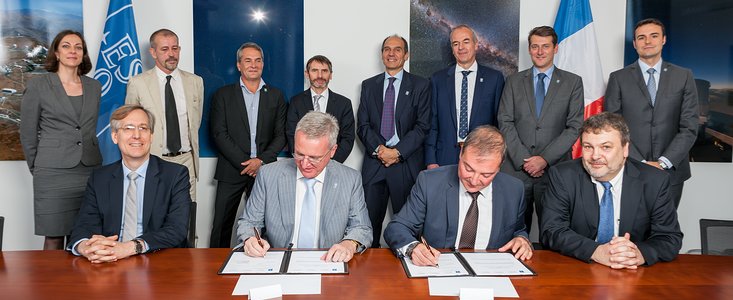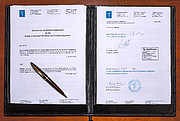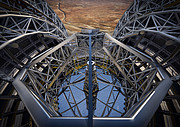Mitteilung
Vertragsunterzeichnung über das Schleifen des Sekundärspiegels des E-ELT
Die französische Firma Reosc wird den bisher größten Sekundärspiegel schleifen
6. Juli 2016
Die ESO hat einen Vertrag mit der französischen Firma Reosc [1] über das Schleifen des Sekundärspiegels für das zukünftige European Extremely Large Telescope (E-ELT) aus einem vorgeformten Glaskeramik-Rohling unterzeichnet. Reosc ist eine Untereinheit von Safran Electronics & Defense und wird den Spiegel sowie die Montageschnittstelle konstruieren, die Oberfläche polieren und allen notwendigen optischen Tests vor der Lieferung durchführen, die für 2022 geplant ist.
Der Vertrag wurde von ESO-Generaldirektor Tim de Zeeuw und M. Thierry Batut, dem Geschäftsführer von Reosc, unter Anwesenheit von M. Jean-Claude Brunet, dem französischen Generalkonsul, weiteren führenden Vertretern von Reosc und wichtigen ESO-Mitarbeitern in München unterzeichnet.
Der Sekundärspiegel ist, wie der Name bereits sagt, der zweite von fünf Spiegeln, die das Licht entfernter Objekte durch das Teleskop leiten, bevor es im Nasmyth-Fokus auf die wissenschaftlichen Instrumente trifft. Der Spiegel wird kopfüber an der Spitze der Teleskopstruktur, hoch über dem 39-Meter-Primärspiegel montiert. Er ist der bisher größte Sekundärspiegel, der jemals in einem Teleskop verwendet wurde, und der größte jemals produzierte Konvexspiegel. Mit mehr als 4 Metern im Durchmesser ist er so groß wie die Primärspiegel einiger professioneller, erstklassiger Teleskope. Der Spiegel wird mit einer Präzision von 15 Nanometern (15 Millionstel eines Millimeters) der optischen Oberfläche geformt und poliert [2]. Als stark konvexer, asphärischer Spiegel ist seine Herstellung eine besondere Herausforderung — das Ergebnis wird ein bemerkenswertes Beispiel der Präzisionsoptik darstellen. Wie viele der Elemente des E-ELT ist er eine wirkliche Neuentwicklung.
Endnoten
[1] Reosc ist eine Untereinheit von Sagem, einer Safran Hochtechnologie-Firma, und ist weltweit führend für das Design, die Produktion und Integration von Hochleistungsoptiken, die beispielsweise in der Astronomie, im Weltall, in Hochenergielasern und in der Halbleiterindustrie eingesetzt werden. Reosc entwickelt und produziert Hochleistungsoptiken für Satelliten, große Teleskope, Hochenergielaser und die Halbleiterindustrie. Die Firma hat außerdem die 8-Meter-Spiegel für das Very Large Telescope der ESO das internationale Gemini-Teleskop, die 11-Meter Spiegel für das Gran Telescopio de Canarias, die Spiegel für das europäische Nirspec-Instrument am James Webb Space Telescope der NASA sowie die Spiegel für den Astronomiesatelliten GAIA der ESA gefertigt.
[2] Wenn der Spiegel einen Durchmesser von 700 km besäße (das entspricht dem Abstand zwischen dem ESO-Hauptsitz in Garching und dem Sitz von Reosc in Saint-Pierre du Perray in Frankreich), würde die Präzision 3 mm entsprechen.
Links
- ESOcast 84: Enthüllung des neuen E-ELT-Designs
- Die ESO unterzeichnet den Vertrag für die deformierbaren Schalenspiegel des E-ELT
Kontaktinformationen
Richard Hook
ESO Public Information Officer
Garching bei München
Tel: +49 89 3200 6655
Mobil: +49 151 1537 3591
E-Mail: rhook@eso.org
Über die Mitteilung
| ID: | ann16045 |
Our use of Cookies
We use cookies that are essential for accessing our websites and using our services. We also use cookies to analyse, measure and improve our websites’ performance, to enable content sharing via social media and to display media content hosted on third-party platforms.
ESO Cookies Policy
The European Organisation for Astronomical Research in the Southern Hemisphere (ESO) is the pre-eminent intergovernmental science and technology organisation in astronomy. It carries out an ambitious programme focused on the design, construction and operation of powerful ground-based observing facilities for astronomy.
This Cookies Policy is intended to provide clarity by outlining the cookies used on the ESO public websites, their functions, the options you have for controlling them, and the ways you can contact us for additional details.
What are cookies?
Cookies are small pieces of data stored on your device by websites you visit. They serve various purposes, such as remembering login credentials and preferences and enhance your browsing experience.
Categories of cookies we use
Essential cookies (always active): These cookies are strictly necessary for the proper functioning of our website. Without these cookies, the website cannot operate correctly, and certain services, such as logging in or accessing secure areas, may not be available; because they are essential for the website’s operation, they cannot be disabled.
Functional Cookies: These cookies enhance your browsing experience by enabling additional features and personalization, such as remembering your preferences and settings. While not strictly necessary for the website to function, they improve usability and convenience; these cookies are only placed if you provide your consent.
Analytics cookies: These cookies collect information about how visitors interact with our website, such as which pages are visited most often and how users navigate the site. This data helps us improve website performance, optimize content, and enhance the user experience; these cookies are only placed if you provide your consent. We use the following analytics cookies.
Matomo Cookies:
This website uses Matomo (formerly Piwik), an open source software which enables the statistical analysis of website visits. Matomo uses cookies (text files) which are saved on your computer and which allow us to analyze how you use our website. The website user information generated by the cookies will only be saved on the servers of our IT Department. We use this information to analyze www.eso.org visits and to prepare reports on website activities. These data will not be disclosed to third parties.
On behalf of ESO, Matomo will use this information for the purpose of evaluating your use of the website, compiling reports on website activity and providing other services relating to website activity and internet usage.
Matomo cookies settings:
Additional Third-party cookies on ESO websites: some of our pages display content from external providers, e.g. YouTube.
Such third-party services are outside of ESO control and may, at any time, change their terms of service, use of cookies, etc.
YouTube: Some videos on the ESO website are embedded from ESO’s official YouTube channel. We have enabled YouTube’s privacy-enhanced mode, meaning that no cookies are set unless the user actively clicks on the video to play it. Additionally, in this mode, YouTube does not store any personally identifiable cookie data for embedded video playbacks. For more details, please refer to YouTube’s embedding videos information page.
Cookies can also be classified based on the following elements.
Regarding the domain, there are:
- First-party cookies, set by the website you are currently visiting. They are stored by the same domain that you are browsing and are used to enhance your experience on that site;
- Third-party cookies, set by a domain other than the one you are currently visiting.
As for their duration, cookies can be:
- Browser-session cookies, which are deleted when the user closes the browser;
- Stored cookies, which stay on the user's device for a predetermined period of time.
How to manage cookies
Cookie settings: You can modify your cookie choices for the ESO webpages at any time by clicking on the link Cookie settings at the bottom of any page.
In your browser: If you wish to delete cookies or instruct your browser to delete or block cookies by default, please visit the help pages of your browser:
Please be aware that if you delete or decline cookies, certain functionalities of our website may be not be available and your browsing experience may be affected.
You can set most browsers to prevent any cookies being placed on your device, but you may then have to manually adjust some preferences every time you visit a site/page. And some services and functionalities may not work properly at all (e.g. profile logging-in, shop check out).
Updates to the ESO Cookies Policy
The ESO Cookies Policy may be subject to future updates, which will be made available on this page.
Additional information
For any queries related to cookies, please contact: pdprATesoDOTorg.
As ESO public webpages are managed by our Department of Communication, your questions will be dealt with the support of the said Department.






